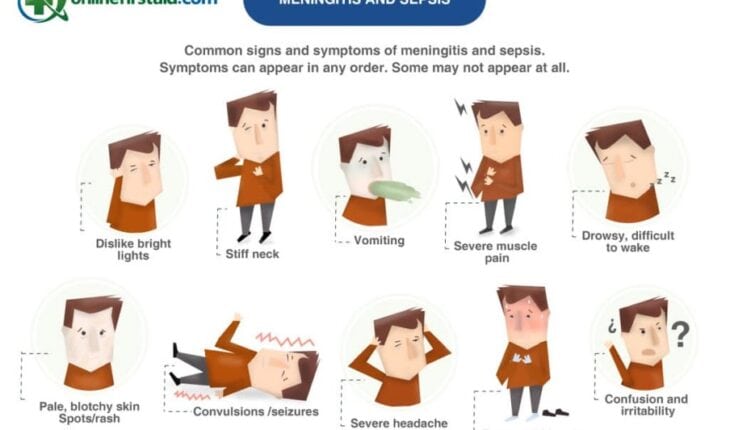
Causes
Meningitis is often spread by a bacteria or virus held in the nose or throat. This means that kissing, sneezing or coughing spreads it.
Viral meningitis can be very unpleasant but it is rarely life threatening and most people make a full recovery.
Bacterial meningitis is more serious and often life-changing or fatal.
Meningitis can be hard to recognise at first as early symptoms are similar to flu and other common illnesses
Often the person holding the bacteria or virus is asymptomatic, meaning they don’t know that they’re spreading it. This means it’s really important to be protected against it with a vaccine.
Symptoms
- Fever – particularly with cold hands and feet, a headache and feeling generally unwell
- Vomiting, diarrhoea and difficulty breathing
- Floppy, lifeless and drowsy
- A rash. This may not appear for all, but if someone is unwell and you see a rash which does not disappear when pressure is applied to it (the tumbler test) call an ambulance
These symptoms can appear in any order. More information here.
Young children are at the most risk for meningitis. Here are some symptoms specific to toddlers and babies:
- Pale, mottled skin
- Cold hands and feet
- Refusing to eat/ feed
- Irritable, not wanting to be held/ touched
- Body going stiff and making jerky movements, or becoming floppy and unable to stand up
- A tense or bulging soft spot on the head (fontanelle)
- High pitched moaning
Meningitis rash and the tumbler test
Most rashes disappear when you apply pressure to the skin. With meningitis, the rash is different and remains visible when a clear glass tumbler is pressed over the skin (the tumbler test). Do not wait for a rash as symptoms can appear in any order and some may not appear at all.
It can be harder to see a rash on dark skin. Check the soles of the feet, palms of hands, roof of mouth and inside eyelids.
Meningitis can kill in 4 hours.
When to call an ambulance
- If the casualty is getting worse and you are seriously concerned
- If they have a rash you are still able to see when you apply pressure with the side of a glass.
- If they are seriously unwell and have some of the above symptoms
Otherwise, call your GP. If you cannot get to talk to the doctor immediately, get the casualty to hospital.
If you are sent home from the hospital or GP surgery and the child gets worse, go back. Trust your instincts and tell them you are worried!
Teenagers
Teenagers are the most at risk group after young children particularly due to the way that meningitis is spread. A teenager may kiss someone not knowing they’re carrying meningitis!
Data from 2022 by the UK Health Security Agency (UKHSA) showed a sharp increase in MenB menigitis in university students in England.
1 in 4 of 15-19 year olds carry meningococcal bacteria, which can cause meningitis, compared to 1 in 10 of the UK population.
Samantha and Joe Gray lost their son Joe in 2018 to meningitis, when he was just 16. He experienced a flu-type cold in the days before his death, as well as severe headache and vomiting. The family are now urging teenagers to take advantage of all the vaccinations they can get to avoid a tragedy like this happening again.
It is really easy to confuse the symptoms of meningitis with freshers’ flu, so it’s really important that teenagers and university students are protected and educated.
Vaccines
The MenACWY vaccine is typically offered to students in year 9 and year 10 in the UK, but anyone up to the age of 25 can receive the vaccine through their GP. It protects against four strains of meningitis. The NHS strongly advises that freshers receive this vaccine before starting university. Find out more here
Figures from 2022 estimated that 64,000 of first year students were unvaccinated. It is vital that parents and students are aware of the risks of meningitis and book a free vaccine from the NHS as soon as possible.
Inda Glennie, from the Meningitis Research Foundation said:
‘It’s encouraging to see that the MenACWY vaccine is working, and important for everyone eligible to get the vaccine. However, teenagers and young adults remain susceptible to MenB disease and are not eligible for routine MenB vaccine, due to low case numbers in this age group since the vaccine was introduced for babies.
The data published by UKHSA has highlighted that students, particularly those living on campuses, have a higher risk of meningococcal disease than their peers. It is essential that students, young people and their families remain vigilant to the signs and symptoms of meningitis and septicaemia (triggers sepsis). Meningitis progresses rapidly, so it’s critical to alert someone if ill, and to seek urgent medical advice.’
If you haven’t received the MenACWY vaccine, please contact your doctor and schedule an appointment. It could save your life.
- What is a seizure? - 13th March 2025
- Febrile Convulsions and Seizures in Children - 13th March 2025
- Why women are less likely to receive CPR or survive cardiac arrest - 6th March 2025






